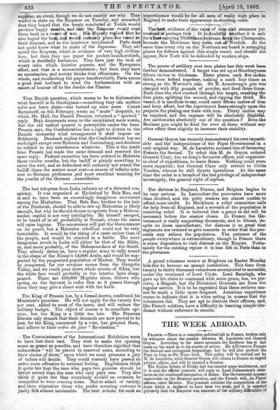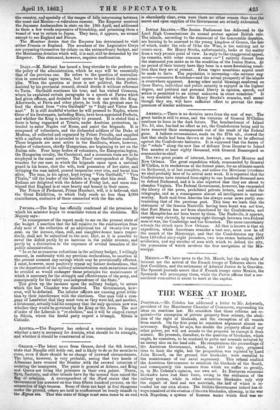THE WEEK ABROAD •
Goyan. According to the latest accounts the Emperor has at last the Second and extinguish brigandage, but he will also protect the by whispers about the contest between M. Lavalette and General made up his mind as to his course of action. He will remove Francis Pope as long as Pio Nono lives. This policy will be carried out by M. de Lavarette, while General Goyon will return to France on urgent
FRANCE.—There is a complete political hill in France, broken only
private affairs, and will be created a Senator.
The Italian debate of Friday last has created some excitement, and it is said the official journals will reply to Lord Palmerston's stric- tures on the continued occupation of Home. The Government appears immovable on the Mexican question, and the French will, La Petrie affirms, enter Mexico. The journals criticise the composition of the 1 force which is declared to have been too weak, and it is asserted privately that the Emperor was unaware of the military difficulties of
the country, and specially of the ranges of hills intervening between the coast and Mexico—a ridiculous rumour. The Emperor received the Japanese Ambassadors in state on the 13th April, and addressed to them a few words expressive of friendship, and promising them a vessel of war to return to Japan. They have, it appears, no errand except to see England and France.
The Moniteur denies that the Emperor has determined to visit either Prussia or England. The members of the Legislative Corps are preparing themselves for debate on the extraordinary bud,.,..et, and the Montauban dotation which will, it is said, still be demanded by the Emperor. This statement, however, requires confirmation.
Rattazzi has issued a long circular to the prefects on the policy of the administration, which he says Will be essentially that of the previous one. He refers to the question of centraliza- tion in somewhat vague terms, but seems to lay down these princi- -ples. When the question at issue is not political, the Prefect, assisted by his provincial council, should decide it without reference to Turin. Garibaldi continues his tour, and has visited Cremona, -where he explained certain paragraphs in a speech at Parma which had given offence, and declared that he was at one with the King. Afterwards, at Pavia and other places, he took the greatest care to lead the shout from "viva Garibaldi" to "Italy and Victor Ema- nuel." It is still doubtful whether be will proceed to Naples, where three of his lieutenants, including Bixio, have been appointed Prefects, and whither the King is immediately to proceed. It is stated that a force is being organized at Trieste, under Austrian protection, in- tended to enter Naples yid Rome, and assist the brigands. It is composed of volunteers, and the disbanded soldiers of the Duke of Modena, all collected and,organized by Prince Petra; and supplied with a uniform which is intended to imitate the Garibaldian costume. These brigands are most active in the Basilicata, where, however, bodies of volunteers, chiefly Hungarians, are beginning to act on the Italian side. Four large bodies of volunteers, the Hungarian legion, the Hungarian cavalry, the Cacciatori, and a mountain train are to be employed in the same service. The Times' correspondent at Naples vouches for one case in which the brigands came upon a national guard in his house, shot the wife, took possession of her sister, and stripping the man naked, poured turpentine over him, and burnt him alive. The man, in his agony, kept crying "Viva Garibaldi," "Viva rItalia," till the leader of the bandits m a rage shot him dead. The Italians are delighted with the debate of Friday last, and seem con- vinced that England is at once hearty and honest in their cause.
The Prince of Piedmont, Prince Humbert, will, it is believed, visit the Great Exhibition, to which Italy sends no less than 2,000 contributors, exclusive of those connected with the fine arts.
Paussis..—The King has officially confirmed all the promises by -which his minister hopes to conciliate voters at the elections. His Majesty says : "in consequence of the report made to me on the present state of the budget I sanction that the bill relative to the continuation from July next of the collection of an additional tax of twenty-five per emit. on the income, class, mill, and slaughter-house taxes respec- lively, shall not be submitted to the next Diet, as it is possible to over the deficit partly by an increase in the public revenue, and partly by a diminution in the expenses of several branches of the public administration. "In so far as concerns reductions in the military budget, I willingly consent, in conformity with my previous declarations, to sanction at the present moment any savings which may be provisionally effected. I must, however, most positively repeat my former declarations, that in the department of the military administration such reductions must be avoided as would endanger these principles the maintenance of -which is necessary for the strength and effectiveness of the army, and consequently for the safety and independence of the State."
This gives up the increase upon the military budget, to secure which the last Chamber was dissolved. The Governmeut, how- ever, will be defeated. The inferior officers are causing great irrita- tion by their interference with the elections. One man told a com- pany of Landwher that they must vote as they were bid, and another, a lieutenant, actually told his company that the only question now was whether they would be governed by the King or the Jews. The mot il'ordre of the Liberals is "re-election," and it will he obeyed except in Silesia, where the feudal party expect a triumph. Silesia is Catholic.
AIISTRIA.—The Emperor has ordered a commission to inquire whether a navy is necessary for Austria, what should be its strength, - and whether it should be constructed of iron.
GREECE.—The latest news from Greece, dated the 6th instant, state that Nauplia still holds out, and is likely to do so for months to come, even if there should be no change of outward circumstances. The latter, however, is very probable, seeing that two bands of Albanians have crossed the frontier with the avowed intention of assisting the insurgents. The panic is general at Athens, and King and Queen are living like prisoners in their own palace. Naxos, Syra, tzantorin, and other islands have for the second time raised the flag of rebellion. A correspondent of the Nord states that the Government has arrested no less than fifteen hundred persons, on the accusation of high treason. Some of them are kept in foul diuigeons under the ground, others are held in confinement on lonely islands in the Egean sea. That this state of things must soon come to an end
is abundantly clear, even were there no other reason than that the secret and open supplies of the Government are utterly exhausted.
IONIAN ISLANDS.—The Ionian Parliament has delivered to the Lord High Commissioner its annual protest against British rule. The islands, according to the statement of the honourable deputies, are burning to be annexed to the young kingdom of Greece, the fate of which, under the rule of Otlio the Wise, is too enticing not to create envy. Sir Henry Storks, unfortunately, looks at the matter from a very prosaic point of view. In reply to the exaggerated appeal, he remarks, with sober common sense :—" I entirely dissent from the statement you make as to the condition of the Ionian States. At no period of their history have they been in a more flourishing condi- tion than they are at present. From vague assertions appeal must be made to facts. The population is increasing—the revenue aug- ments—commerce flourishes—and the actual prosperity of the islands is everywhere apparent. Among other social blessings conferred on these States, individual and public security is enjoyed in the highest degree, and politieal and personal liberty in opinion, speech, and action is permitted to an extent unknown in other countries." It is very doubtful whether Sir Henry Storks's remarks, well meant though they are, will have sufficient effect to prevent the reap- pearance of similar addresses.
AMERICA.--There is no decisive news from the seat of war. The great battle is still to come, and the victories of General M'Clellan continue to loom in the dark future. The bombardment of Island No. 10, also, has had no effect as yet, the Confederates being said to have removed their encampments out of the reach of the Federal guns. A balloon reconnaisance, made on the 27th ult., showed the fact that shells had been thrown at too high a range to be effectual against the Confederate batteries. It is supposed that the forces of the " rebels " along the new line of defence from Decatur to Island Ten number at least eighty thousand, with General Beauregard as commander-inehief.
The two great points of interest, however, are Fort Monroe and New Orleans. The great expedition which, commanded by General M'Clellan, is to rendezvous at the former place, for an ultimate march on Richmond, is at last complete, and unless the Merrimac interferes we shall probably hear of its arrival next week. It is reported that the Confederates have retained from eighty to one hundred thousand men to defend Richmond, and it is also reported that they are about to abandon Virginia. The Federal Government, however, has suspended the liberty of the press, prohibited private letters, and seized the telegraphs, and as a consequence almost all intelligence is untrust- worthy. Each mail from America has always some news partly con- tradicting that of the previous post. This time we learn that the statement of the famous Nashville having been burnt was not true, that Fort Macon has not been abandoned by the Confederates, and that Memphis has not been burnt by them. The Nashville, it appears, escaped very cleverly, by running right through between two Federal men-of-war, the Cambridge and the Gemsbok. The same uncertainty attends the attack upon New Orleans. All that is known is that an expedition, which Americans consider a vast one, must now be off the mouth of the Mississippi, and that the Confederates say they have 120 rifled sixty-eight pounders, two iron steam batteries, 4000 artillerists, and any number of men with which to defend the city, the possession of which involves the free navigation of the Mis- sissippi.
MEnco.—We have news to the 7th March, but the only facts of interest are the arrival of the French troops at Tahucan above the first Cordillera, and the retirement of Admiral Jurien de la Graviere. The Spanish journals assert that if French troops enter Mexico, the Spaniards will accompany them, while the Paine affirms that a mo- narchical committee is about to meet at the capital.































 Previous page
Previous page